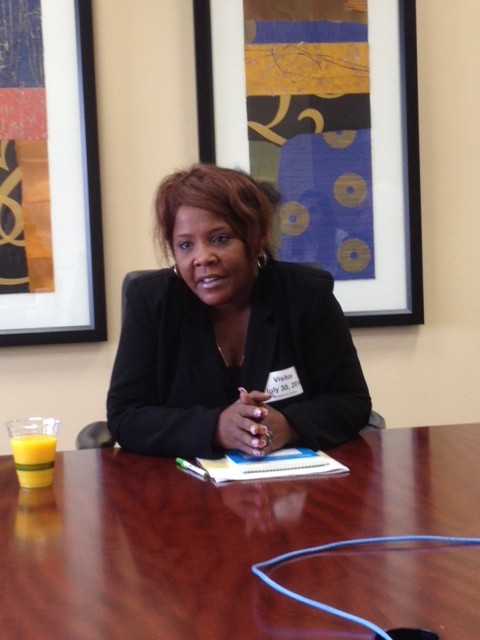Cuban dissident Yris Tamara Pérez Aguilera personifies courage. The petite Afro-Cuban dissident has suffered beatings, imprisonment and sexual harassment at the hands of Raul Castro’s goons in Cuba. And yet she was in Washington Wednesdaycalling for world support for the Cuban people, knowing full well that, as she said, “I will pay for this once I go back.”
The president of Cuba’s Rosa Parks Civil Rights Movement had a clear message for the Congressional Black Caucus, which has always shown a strange soft side for the 55-year communist dictatorship of the Castro brothers: quit giving comfort to Cuba’s racist leadership.
“They should look closely at Cuba’s Council of State, and see how many black Cubans they find there,” Perez said at a small meeting with journalists, think tankers and former diplomats.
And of course, she’s right. A quick glance at the pictures of Cuba’s top government body on their own website reveals that only eight out of 31 are black, and there’s only one black Cuban in the top echelon constituted by seven vice presidents and President Raul Castro.
While racial figures are hard to come by, mainly because Castro’s own figures distort the island’s ethnic makeup (its latest claim that the black population was 10 percent and the white population 65 percent is risible), visitors report that the population that is black or mixed is now a majority. The Economist put it this way in 2008: “Mr Castro’s Cuba is a sad place. Although the population is now mainly black or mulatto and young, its rulers form a mainly white gerontocracy.”
This white gerontocracy oppresses black dissidents with fury. “Around 75 percent of the people in prison are black,” said Perez. “Black Cubans have no rights.”
Perez would like to meet with members of the CBC while she’s here in Washington to explain to them Cuba’s realities. She’s not holding her breath, however. Reps. Barbara Lee, D-Calif.,, Emanuel Cleaver, D-Mo., and Gregory Meeks, D-N.Y., all CBC members, were in Cuba in May, but refused to meet Perez.
“While I was languishing in prison, they paraded around Havana. My sister tried to deliver a petition asking them to come and visit me. They didn’t even accept it,” said Perez, who’s married to Cuba’s best known dissident, Jorge Luís García Perez, known as Antúnez and also as Cuba’s Nelson Mandela. Jorge Perez also constantly suffers imprisonment and beatings at the hands of the regime.
Perez would also like to have an audience with Michelle Obama while here, but she told me that she would not meet with her husband, President Barack Obama. “If it were up to him the embargo would already have been lifted,” she said.
On this Perez is very clear: the moves Obama has made since he took office to have a rapprochement with Cuba’s dictators will end as well as the Russian “reset.” “Lifting the embargo would be dreadful for the Cuban people,” as it would legitimize Cuba’s lawless government, warns Perez. Rather than try to lift the embargo, Obama should “be concerned with the plight of the Cuban people, with the opposition. He’s blinded by the regime!”
As Perez described how Cuba’s political police constantly break into her house, beat her, manacle her, “feel all my private parts,” and then throw her into prison for days, I told her that I had recently debated Salem State professor Aviva Chomsky on television and that she had declared that there is no repression in Cuba. She made a face of revulsion:“Tell her to come to the deepest parts of Cuba, so she can see how dissidents are beaten up.”
Perez is remarkably clear-eyed about the world for someone who has spent her entire life inside a communist dictatorship. She understands that she can expect nothing from a feckless European Union, for example. But she called on freedom-loving people around the world to organize Twitter campaigns every time there’s news that dissidents have been beat up, and to send computers to Cubans. “Everyone has the right to live in freedom,” she said, channeling Thomas Jefferson.



























